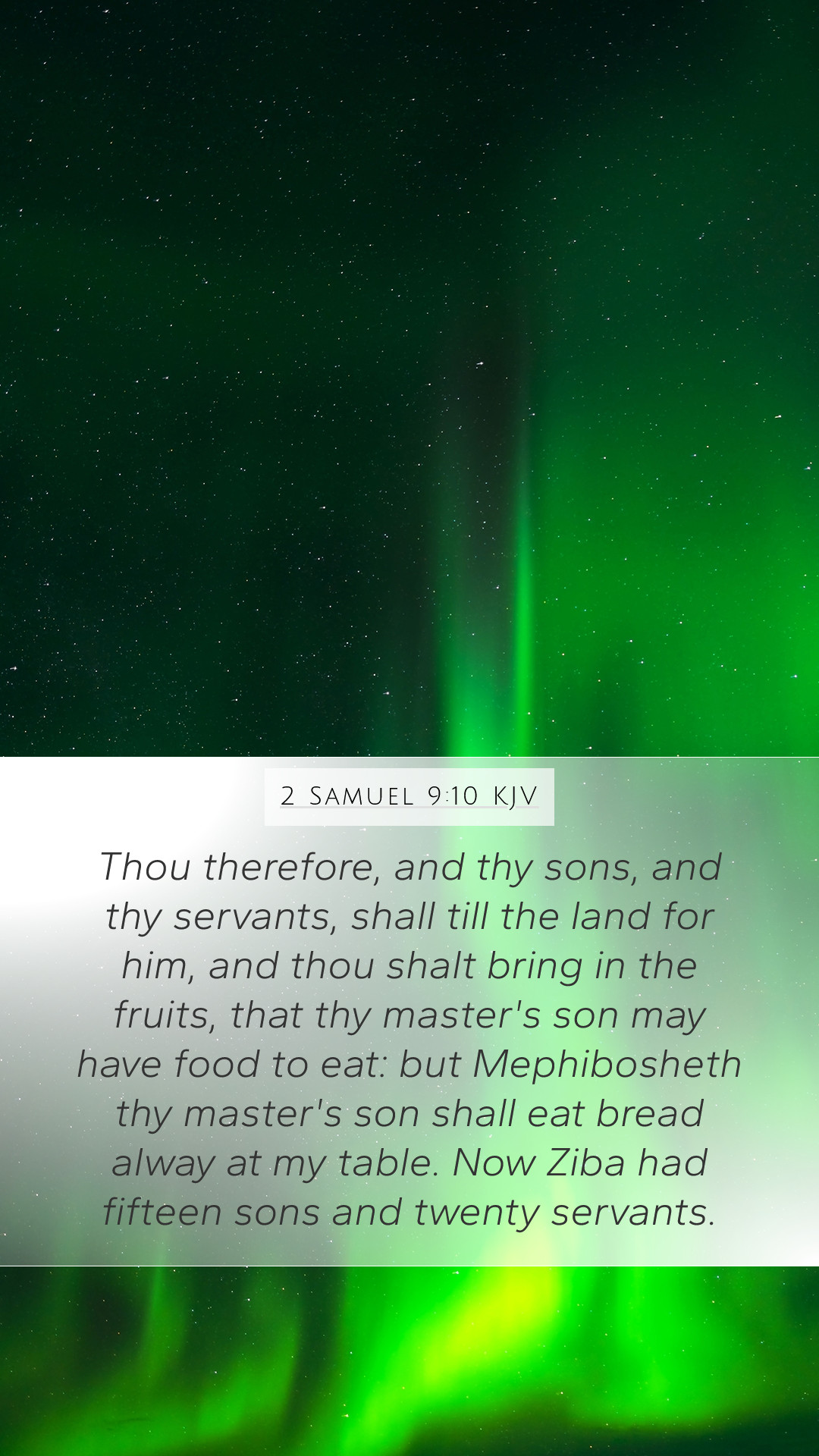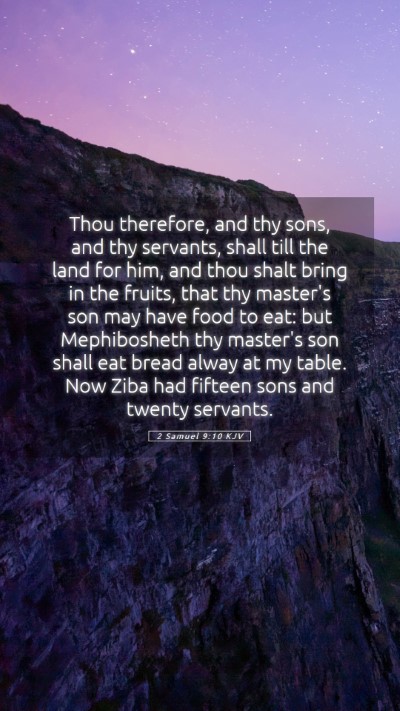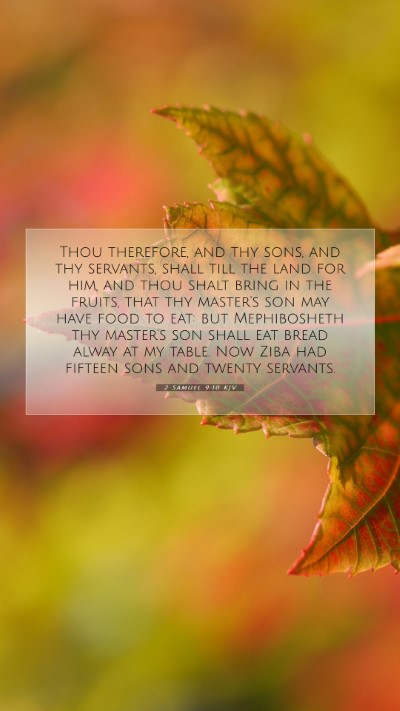Old Testament
Genesis Exodus Leviticus Numbers Deuteronomy Joshua Judges Ruth 1 Samuel 2 Samuel 1 Kings 2 Kings 1 Chronicles 2 Chronicles Ezra Nehemiah Esther Job Psalms Proverbs Ecclesiastes Song of Solomon Isaiah Jeremiah Lamentations Ezekiel Daniel Hosea Joel Amos Obadiah Jonah Micah Nahum Habakkuk Zephaniah Haggai Zechariah Malachi2 Samuel 9:10 Meaning
What is the meaning of 2 Samuel 9:10?
Thou therefore, and thy sons, and thy servants, shall till the land for him, and thou shalt bring in the fruits, that thy master's son may have food to eat: but Mephibosheth thy master's son shall eat bread alway at my table. Now Ziba had fifteen sons and twenty servants.
2 Samuel 9:10 Bible Verse Meaning
Understanding 2 Samuel 9:10: A Comprehensive Commentary
2 Samuel 9:10 reads: "And thou shalt eat bread at my table, continually." This verse reveals a profound act of kindness and loyalty that King David extends to Mephibosheth, the son of Jonathan. Understanding this verse entails examining the broader themes of mercy, covenant loyalty, and divine grace as expressed through David's actions.
Summary of 2 Samuel 9:10
In context, this chapter narrates how David seeks to honor his promise to Jonathan, thus illustrating the concept of loyalty and kindness that transcends mere obligation. Mephibosheth, who was physically disabled and thought to be insignificant, is invited to partake in the king's table, showcasing God’s grace in unexpected ways. The verse emphasizes the significance of fellowship and inclusion, reflecting God's everlasting kindness to humanity.
Commentary Insights
-
Matthew Henry:
Henry emphasizes the grace of David in reaching out to Mephibosheth, highlighting that despite Mephibosheth's unworthiness due to his physical incapacity, David’s kindness is an act of love rooted in his covenant with Jonathan. This act is a reflection of God's grace toward sinners, demonstrating that divine favor is not based on merit but on love and promise.
-
Albert Barnes:
Barnes explains that the act of inviting Mephibosheth to eat at the king's table signifies restoration and acceptance. He sees this act as a portrayal of God’s invitation to unity with believers despite their shortcomings and disabilities. It highlights the key idea that God often uses the least among us to display His glory.
-
Adam Clarke:
Clarke points out the symbolic nature of sitting at the king's table, which signifies being treated as a member of the royal family. He links this to the New Testament idea of being an heir with Christ. Clarke encourages readers to recognize Jesus' invitation to dine with Him, reflecting the same grace that David extended to Mephibosheth.
Thematic Analysis
The overarching themes in 2 Samuel 9:10 can be classified as:
-
Grace and Mercy:
David's actions embody grace, as he honors his covenant with Jonathan to show kindness to his family regardless of their social or physical condition. This offers a glimpse into the nature of God’s grace, which invites all to partake in His blessings.
-
Restoration:
Mephibosheth's invitation symbolizes restoration and inclusion, where he goes from being a forgotten heir to a cherished guest at the king's table. This reflects God’s tendency to restore broken relationships through His grace.
-
Covenant Loyalty:
David’s commitment to honoring his covenant with Jonathan illustrates the importance of faithfulness in relationships. It reminds believers of God’s unbreakable promise to their lives, highlighting the essence of fidelity and love in divine interactions.
-
Human Worth:
Though Mephibosheth was considered lowly and unworthy, David’s actions demonstrate that every person has inherent value in the eyes of God. This encourages the understanding that God’s love extends to all, regardless of their circumstances.
Cross References
- 2 Samuel 4:4: Discusses Mephibosheth's background and disability.
- 1 Samuel 20:14-17: The covenant between David and Jonathan regarding kindness to each other’s descendants.
- Luke 14:13-14: Jesus speaking about inviting the poor and those who cannot repay.
Applications for Daily Life
Understanding 2 Samuel 9:10 invites believers to reflect on their own lives in light of the themes of grace and mercy. Here are a few applications:
-
Practize Kindness:
Like David, strive to extend kindness to those society overlooks or undervalues, embodying God's grace in everyday interactions.
-
Honor Commitment:
Seek to honor commitments and promises, particularly to those who are vulnerable or marginalized, maintaining integrity in relationships.
-
Embrace Inclusivity:
Be open to including others in your circle regardless of their background or circumstances, fostering communities of acceptance and love.
-
Recognize Worth:
Remember the inherent worth that everyone carries as a creation of God, allowing this to shape how you view and interact with others.
Conclusion
2 Samuel 9:10 serves as a poignant reminder of the transformational power of grace and kindness. It encourages believers to reflect on their own relationships and actions, while also providing a deeper understanding of God's covenant loyalty towards humanity. By exploring this verse through the lens of scripture commentary and thematic analysis, individuals can gain profound insights into their own lives and how they can embody these biblical principles in modern-day contexts.


